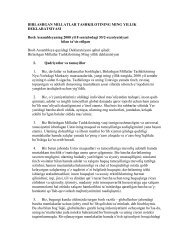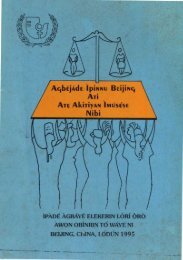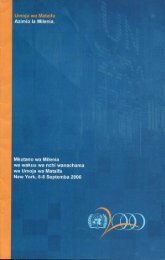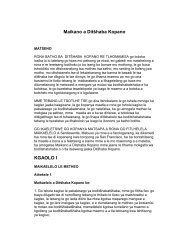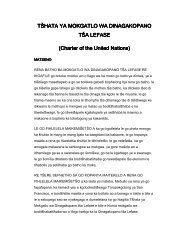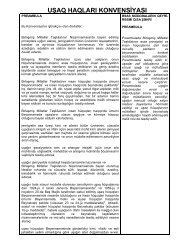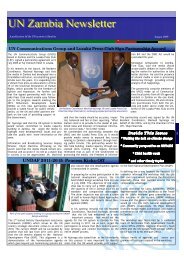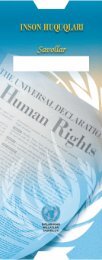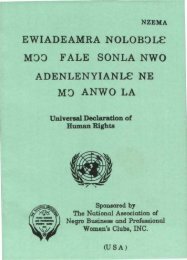Download Newsletter - United Nations Information Centres
Download Newsletter - United Nations Information Centres
Download Newsletter - United Nations Information Centres
Create successful ePaper yourself
Turn your PDF publications into a flip-book with our unique Google optimized e-Paper software.
VOLUME 37 AUGUST, 2011<br />
Hammarskjöld’s overarching<br />
and primary commitment was<br />
to the evolution of the<br />
<strong>United</strong> <strong>Nations</strong>. Whether he<br />
recognized it or not, he was<br />
the <strong>United</strong> <strong>Nations</strong> able pilot<br />
on this journey.<br />
sufficiently robust to prevent UN<br />
contingents from ceding the<br />
initiative to peace spoilers.<br />
The New Horizon non-paper took<br />
stock of the increasing scale and<br />
complexity of UN peacekeeping<br />
operations in the first decade of the<br />
new millennium. It emphasized the<br />
need to forge a stronger political<br />
consensus, shift the focus from<br />
quantity to quality and capabilities<br />
of troops, enhance the<br />
accountability among the<br />
stakeholders of UN peacekeeping,<br />
and develop a coherent strategy for<br />
the <strong>United</strong> <strong>Nations</strong> field support<br />
system.<br />
The Brahimi Report and the New<br />
Horizon non-paper offered an<br />
encouraging direction, while<br />
honouring the spirit and letter of the<br />
Charter and reiterating the basic<br />
principles of UN peacekeeping. The<br />
documents recognize, as<br />
Hammarskjöld did with regard to<br />
the <strong>United</strong> <strong>Nations</strong> as a whole, that<br />
UN peacekeeping is an imperfect<br />
but indispensable instrument for the<br />
international community.<br />
The increasing numbers of<br />
international actors, as well as the<br />
broader agenda, do not depreciate<br />
the role and importance that the<br />
<strong>United</strong> <strong>Nations</strong> plays in global<br />
peacekeeping. On the contrary, it is<br />
an affirmation of the importance of<br />
the task itself and an<br />
acknowledgement that many states<br />
UN <strong>Information</strong> Centre Kathmandu<br />
and regional actors today feel a<br />
direct responsibility to partake in the<br />
global agenda for peace and<br />
conflict prevention. The <strong>United</strong><br />
<strong>Nations</strong> role will be different from<br />
the role it played in the fifties and<br />
sixties, but it will not be less<br />
important. The <strong>United</strong> <strong>Nations</strong> will<br />
still provide legitimacy for<br />
necessary actions and be the<br />
primary coordinator of the<br />
international response to future<br />
global and regional crises. In all its<br />
diversity, the <strong>United</strong> <strong>Nations</strong> will still<br />
be the main forum for the<br />
international dialogue on<br />
peacekeeping, conflict prevention,<br />
and conflict resolution.<br />
The <strong>United</strong> <strong>Nations</strong> is a cornerstone<br />
of Sweden‘s foreign policy.<br />
Together with our fellow members<br />
of the European Union, we<br />
welcomed the Brahimi Report and<br />
strongly support the further<br />
development of the New Horizon<br />
initiative. The common ground that<br />
has now been reached needs to be<br />
consolidated and broadened.<br />
First, the importance of protecting<br />
civilians must be acknowledged.<br />
The success or failure to protect<br />
civilians directly affects the<br />
credibility and legitimacy of UN<br />
peacekeeping operations, as well<br />
as their standing with populations in<br />
conflict areas. It is encouraging that<br />
the UN Member States recognized<br />
this circumstance during the 2010<br />
session of the Special Committee<br />
UN n e w s l e t t e r<br />
N e p a l<br />
on Peacekeeping Operations of the<br />
<strong>United</strong> <strong>Nations</strong>. Missions need to<br />
have clear Security Council<br />
mandates, well-crafted guidelines,<br />
robust command and control<br />
systems, and the ability and<br />
determination to perform this<br />
difficult task.<br />
Second, the nexus between<br />
peacekeeping and peacebuilding<br />
must be strengthened. By providing<br />
security and support, peacekeepers<br />
play an enabling role for national<br />
and international actors to<br />
implement long-term peacebuilding<br />
measures in areas such as police,<br />
rule of law, Security Sector Reform<br />
(SSR), and Disarmament,<br />
Demobilization and Reintegration.<br />
Third, the demand for civilian<br />
expertise in fields such as rule of<br />
law, justice, and SSR is increasing,<br />
especially in complex peacekeeping<br />
operations. We must respond to<br />
this by strengthening the supply,<br />
retention, and support of civilian<br />
personnel. It is important that<br />
countries from the Global South be<br />
given equal opportunities to<br />
contribute personnel.<br />
Fourth, we should follow the<br />
example of Dag Hammarskjöld‘s<br />
Summary Study, first published in<br />
1958, and turn our scrutiny to the<br />
UN system itself and our working<br />
methods. It is encouraging to see<br />
that the initiative to start informal<br />
consultations with a view to revising<br />
the working methods of the Special<br />
Committee, forwarded during the<br />
Swedish Presidency of the<br />
European Union in 2009 and the<br />
Spanish Presidency in 2010, has<br />
received widespread support<br />
among UN Member States.<br />
In conclusion, let us remember that<br />
Hammarskjöld‘s overarching and<br />
primary commitment was to the<br />
evolution of the <strong>United</strong> <strong>Nations</strong>.<br />
Whether he recognized it or not, he<br />
was the <strong>United</strong> <strong>Nations</strong> able pilot on<br />
this journey. Hammarskjöld‘s view<br />
that the <strong>United</strong> <strong>Nations</strong> embodied<br />
the ―edge of development of human<br />
society‖ and worked on the ―brink of<br />
the unknown‖ remains an inspiring<br />
vision.<br />
www.un.org.np, kathmandu.unic.org<br />
UNITED NATIONS IN NEPAL<br />
5



